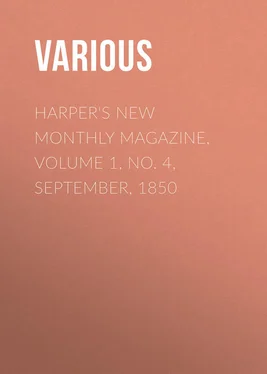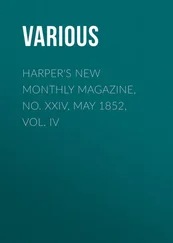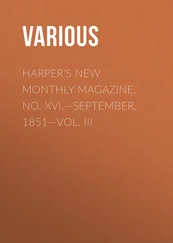Various - Harper's New Monthly Magazine, Volume 1, No. 4, September, 1850
Здесь есть возможность читать онлайн «Various - Harper's New Monthly Magazine, Volume 1, No. 4, September, 1850» — ознакомительный отрывок электронной книги совершенно бесплатно, а после прочтения отрывка купить полную версию. В некоторых случаях можно слушать аудио, скачать через торрент в формате fb2 и присутствует краткое содержание. Издательство: Иностранный паблик, Жанр: periodic, foreign_edu, на английском языке. Описание произведения, (предисловие) а так же отзывы посетителей доступны на портале библиотеки ЛибКат.
- Название:Harper's New Monthly Magazine, Volume 1, No. 4, September, 1850
- Автор:
- Издательство:Иностранный паблик
- Жанр:
- Год:неизвестен
- ISBN:нет данных
- Рейтинг книги:5 / 5. Голосов: 1
-
Избранное:Добавить в избранное
- Отзывы:
-
Ваша оценка:
- 100
- 1
- 2
- 3
- 4
- 5
Harper's New Monthly Magazine, Volume 1, No. 4, September, 1850: краткое содержание, описание и аннотация
Предлагаем к чтению аннотацию, описание, краткое содержание или предисловие (зависит от того, что написал сам автор книги «Harper's New Monthly Magazine, Volume 1, No. 4, September, 1850»). Если вы не нашли необходимую информацию о книге — напишите в комментариях, мы постараемся отыскать её.
Harper's New Monthly Magazine, Volume 1, No. 4, September, 1850 — читать онлайн ознакомительный отрывок
Ниже представлен текст книги, разбитый по страницам. Система сохранения места последней прочитанной страницы, позволяет с удобством читать онлайн бесплатно книгу «Harper's New Monthly Magazine, Volume 1, No. 4, September, 1850», без необходимости каждый раз заново искать на чём Вы остановились. Поставьте закладку, и сможете в любой момент перейти на страницу, на которой закончили чтение.
Интервал:
Закладка:
Men whose renown was built
Not on resplendent guilt —
Not through life’s waste, or the abuse of power,
But by the dauntless zeal
With which at truth’s appeal,
They stood unto the death in some eventful hour.
But he who now shall deem,
Because among us seem
No dubious symptoms of a realm’s decline —
Wealth blind with its excess
’Mid far-diffused distress,
And pride that kills, professing to refine —
He who deems hence shall flow
The utter overthrow
Of this most honored and long happy land,
Little knows what there lies
Even beneath his eyes,
Slumbering in forms that round about him stand.
Little knows he the zeal
Myriads of spirits feel
In love, pure principle, and knowledge strong;
Little knows he what men
Tread this dear land again,
Whose souls of fire invigorate the throng.
My friend! I lay with thee
Beneath the forest tree,
When spring was shedding her first sweets around.
And the bright sky above
Woke feelings of deep love,
And thoughts which traveled through the blue profound.
I lay, and as I heard —
The joyful faith thus stirred,
Shot like Heaven’s lightning through my wondering breast
I heard, and in my thought
Glory and greatness wrought,
And blessing God – my native land I blest.
Now we entered a village inn, and ate our simple luncheon; and now we stood in some hamlet lane, or by its mossy well, with a group of children about us, among whom not a child appeared more child-like or more delighted than the old man. Nay, as we came back from a fifteen or twenty miles’ stroll, he would leap over a stile with the activity of a boy, or run up to a wilding bush, covered with its beautiful pink blossoms, and breaking off a branch hold it up in admiration, and declare that it appeared almost sinful for an old man like him to enjoy himself so keenly. I know not when I more deeply felt the happiness and the holiness of existence, the wealth of intellect, and the blessings of our fancies, sympathies, and affection, than I used to do as this singular stranger sate with me on the turf-seat at the vine-covered end of the old cottage, which then made my temporary residence, on the serene evenings of that season, over our rustic tea-table, and with the spicy breath of the wall-flowers of that little garden breathing around us, and held conversation on many a subject of moral and intellectual speculation which then deeply interested me. In some of those evening hours he at length gave me glimpses into his past existence. Things more strange and melancholy than I could ever have suspected had passed over him, and only the more interested me in him.
Such had been our acquaintance for some months, when, one evening, happening to be in the neighboring town, and passing through a densely-populated part of it, I saw a number of people crowding into a chapel. With my usual curiosity in all that relates to the life, habits, and opinions of my fellow-men, I entered, and was no little surprised to behold my ancient friend in the pulpit. As I believed he had not observed me enter, and as I was desirous to hear my worthy friend, thus most unexpectedly found in this situation, without attracting his attention, I therefore seated myself in the shade of a pillar, and awaited the sermon. My surprise, as I listened to it, was excessive, on more accounts than one. I was surprised at the intense, fervid, and picturesque blaze of eloquence that breathed forth from the preacher, seeming to light up the whole place, and fill it with an unearthly and cloudy fire. I was more astonished by the singularity and wildness of the sentiments uttered. I looked again and again at the rapt and ecstatic preacher. His frame seemed to expand, and to be buoyed up, by his glowing enthusiasm, above the very height of humanity. His hair, white as snow, seemed a pale glory burning round his head, and his countenance, warm with the expression of his entranced spirit, was molten into the visage of a pleading seraph, who saw the terrors of the Divinity revealed before him, and felt only that they for whom he wrestled were around him. They hung upon that awful and unearthly countenance with an intensity which, in beings at the very bar of eternal judgment, hanging on the advocacy of an angel, could scarcely have been exceeded; and when he ceased, and sat down, a sigh, as from every heart at once, went through the place, which marked the fall of their rapt imaginations from the high region whither his words and expressive features had raised them, to the dimness and reality of earth. I could scarcely persuade myself that this was my late friend of the woods and fields, and of the evening discourse, so calm and dispassionate, over our little tea-table.
I escaped cautiously with the crowd, and eagerly interrogated a man who passed out near me who was the preacher? He looked at me with an air of surprise; but seeing me a stranger, he said he thought I could not have been in those parts long, or I should have known Mr. M – . I then learned that my venerable acquaintance was one whose name was known far and wide – known for the strange and fascinating powers of his pulpit eloquence, and for the peculiarity of his religious views. The singularity of those notions alone had prevented his becoming one of the most popular religious orators of his time. They had been the source of perpetual troubles and persecutions to him, they had estranged from him the most zealous of his friends from time to time; yet they were such only as he could lay down at the threshold of Divine judgment; and still, wherever he went, although they were a root of bitterness to him in private, he found in public a crowd of eager and enthusiastic hearers, who hung on his words as if they came at once warm from the inner courts of heaven.
The sense of this discovery, and of the whole strange scene of the last evening, hung powerfully upon me through the following day. I sat on the bench of my cottage window, with a book in my hand, the greater part of it, but my thoughts continually reverted to the image of the preacher in the midst of his audience; when, at evening, in walked the old man with his usual quiet smile, and shaking me affectionately by the hand, sat down in a wooden chair opposite me. I looked again and again, but in vain, to recognize the floating figure and the exalted countenance of the evening.
The old man took up my book, and began to read. A sudden impulse seized me which I have never ceased to regret. I did not wish abruptly to tell the old man that I had seen him in the pulpit, but I longed to discuss with him the ground of his peculiar views, and said,
“What do you think, my friend, of the actual future destiny of the – ?”
I made the question include his peculiar doctrines. He laid down the volume with a remarkable quickness of action. He gazed at me for a moment with a look humbled but not confused, such as I had never seen in him before, and, in a low voice, said,
“You were then at my chapel last night?”
“I was,” I replied.
“I am sorry – I am sorry,” he said, rising with a sigh. “It has been a pleasant time, but it is ended. Good-by, my dear young friend, and may God bless you!”
He turned silently but quickly away.
“Stop!” I cried. “Stop!” But he heard or heeded not. I ran to the gate to lay hold on him, and assure him that his sentiments would not alter my regard for him, but I observed him already hastening down the lane at such a speed that I judged it rude and useless at that moment to pursue.
I went down that day to his lodgings, to assure him of my sentiments toward him, but door and window were closed, and if he were in he would not hear me. Early next morning a little ragged boy brought me a note, saying a gentleman in the lane had given it to him. It simply said:
Читать дальшеИнтервал:
Закладка:
Похожие книги на «Harper's New Monthly Magazine, Volume 1, No. 4, September, 1850»
Представляем Вашему вниманию похожие книги на «Harper's New Monthly Magazine, Volume 1, No. 4, September, 1850» списком для выбора. Мы отобрали схожую по названию и смыслу литературу в надежде предоставить читателям больше вариантов отыскать новые, интересные, ещё непрочитанные произведения.
Обсуждение, отзывы о книге «Harper's New Monthly Magazine, Volume 1, No. 4, September, 1850» и просто собственные мнения читателей. Оставьте ваши комментарии, напишите, что Вы думаете о произведении, его смысле или главных героях. Укажите что конкретно понравилось, а что нет, и почему Вы так считаете.












